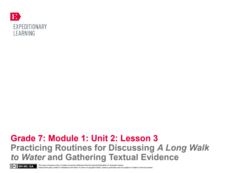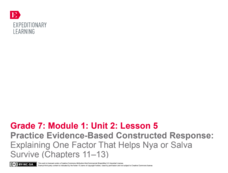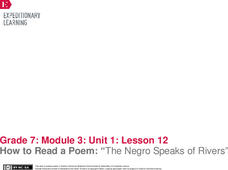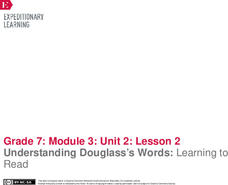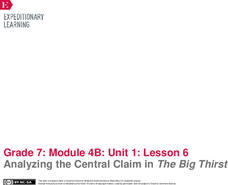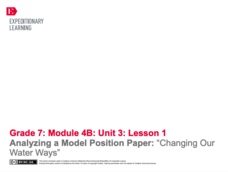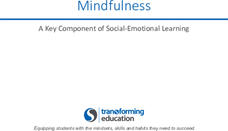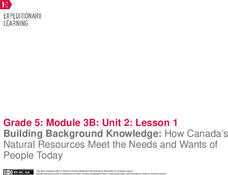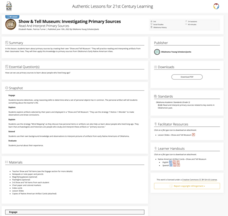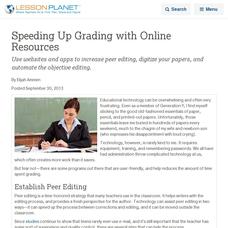EngageNY
Practicing Routines for Discussing A Long Walk to Water and Gathering Textual Evidence
Welcome a new teacher (or two)! While most of the class works on the survival anchor chart, one pair begins the Salva/Nya chart and uses it to teach the class. Each day, scholars switch roles, giving every pair a chance to teach their...
EngageNY
Practice Evidence-Based Constructed Response: Explaining One Factor That Helps Nya or Salva Survive (Chapters 11–13)
Class members work through a model lesson plan in answering constructed response questions. They begin viewing an Evidence-Based Constructed Response sheet and then watch the teacher model. Readers then work as a group to answer a...
EngageNY
Text-to-Text Connections: Pygmalion
Scholars refer to a British Dialect/Slang anchor chart as they answer text-dependent questions over section eight of Pygmalion. While learners work on the questions, the teacher conducts check-ins on the progress of their independent...
EngageNY
Writing an Argument Essay: Developing Claims and Reasons
Scholars begin working on the end-of-unit writing prompt for Pygmalion. They must analyze their collected text evidence to determine what information is compelling enough to include in their argumentative essays. The teacher guides them...
EngageNY
Deepening Your Research: The Effect of Advertising on Gender Roles
Let's get back on the road! Scholars continue using their research roadmaps to explore the role of gender while reading Cover Girl Culture. The teacher guides readers through the text as they underline specific sentences. Learners then...
EngageNY
How to Read a Poem: “The Negro Speaks of Rivers”
Learners listen as a teacher models how to read a poem using The Negro Speaks of
Rivers. They use the How to Read a Poem anchor chart to help guide their thought process on how a poem requires different reading than other text. While...
EngageNY
Poetry Analysis: Small Group Practice
Howdy partner! After discussion and teacher model reading of Slaveships, scholars pair up for a partner reading of the poem. They then use equity sticks to discuss their thoughts of the poem with the class. Readers talk about allusion,...
EngageNY
Understanding Douglass’s Words: Learning to Read
How is a sentence like the human body? Scholars think about the comparison as they view an image of the human anatomy and begin to complete an Anatomy of a Sentence anchor chart. They review roots, prefixes, and suffixes and then begin...
EngageNY
The Storyteller’s Toolbox and Excerpt 4 First Read
It's story time! Scholars take a look through the eyes of a storyteller as the teacher reads aloud The People Could Fly. They also listen as the story is played on video. Learners then answer questions about the reader's facial...
EngageNY
Analyzing the Central Claim in The Big Thirst
Quench the class's thirst for knowledge while building analytical skills. Scholars listen as the teacher reads excerpt from the book The Big Thirst. They then complete a close read and answer text-dependent questions from pages one...
Missouri Department of Elementary
“Re-Solutioning”: Practice Brings Out Our Best
Seventh graders create and perform a skit that demonstrates their conflict resolution skills. They begin by examining the process of crafting a performance and review what they have learned about conflict resolution. Next, they...
EngageNY
Analyzing a Model Position Paper: “Changing Our Water Ways”
Follow the leader for better writing! Scholars analyze a model position paper, "Changing Our Water Ways." During the first pass, they listen as the teacher reads the paper aloud. They then do a second read of the paper and complete a...
EngageNY
Reading Informational Text for Details: Meg’s Rainforest Experiment (Pages 17–20)
Take good notes. Scholars record information in their note catcher sheets as the teacher reads aloud pages 17-20 of The Most Beautiful Roof in the World. Learners then reread parts of the text in groups and rotate to share the notes they...
EngageNY
The Painted Essay: The Introductory Paragraph
Mimic the model for the perfect essay. Scholars work in groups to analyze a model painted essay The Electric Motor. They compare the structure of the model essay to the painted essay template they created in the previous activity. The...
Transforming Education
Mindfulness Toolkit
The Mindfulness Toolkit is designed to provide educators with the information they need to introduce the social-emotional competency of mindfulness into their school. The kit includes background information to help teachers develop their...
EngageNY
Building Background Knowledge: How Canada’s Natural Resources Meet the Needs and Wants of People Today
Learners follow along as the teacher reads Products of Mining in Canada: From Batteries to Vehicles aloud. They then discuss the meaning of key terms and determine the gist of the text. Pupils do a second read and complete a graphic...
EngageNY
Speech Writing: Identifying Criteria for a High-Quality Introduction
Using a helpful resource, pupils watch a TED Talk of an opinion speech as they consider the criteria for a high-quality introduction. Scholars then engage in a shared writing process with the teacher to practice writing the introduction...
K20 LEARN
Show and Tell Museum - Investigating Primary Sources: Read and Interpret Primary Sources
Scholars become detectives in a lesson that focuses on primary sources. Learners practice their observational skills by examining the teacher's artifact and visiting the Show and Tell Museum that highlihgts items from peers and learning...
Curated OER
Teacher's Gift
Students make a framed interview story as a teacher gift. In this interview lesson, students work at home to complete a parent lead interview about their teachers. They draw a picture of their teachers which they frame along with the...
Towson University
Mystery of the Crooked Cell
Can your class solve the Mystery of the Crooked Cell? Junior geneticists collaborate to learn about sickle cell anemia in a fascinating lesson plan. The included materials help them to examine the genetic factors behind the disease...
Towson University
Mystery Disease
How did scientists determine the cause of illness before technology? Science scholars play the role of medical researcher in an engaging guided inquiry activity. Using observations, technical reading, and Punnett squares, learners...
Curated OER
Speeding Up Grading with Online Resources
Use websites and apps to increase peer editing, digitize your papers, and automate the objective editing.
Curated OER
Summer Reading to Encourage Professional Development
A compilation of titles to engage, motivate, and inspire educators for another year of teaching and learning.
Mathematics Vision Project
Quadratic Equations
Through a variety of physical and theoretical situations, learners are led through the development of some of the deepest concepts in high school mathematics. Complex numbers, the fundamental theorem of algebra and rational exponents...
Other popular searches
- Teachers in Space
- Teachers Sites
- Substitute Teachers
- Lesson Plans Music Teachers
- English Teachers
- National Teacher's Day
- Dance Teachers
- New Teachers
- Community Helpers Teachers
- Magna Carta for Teachers
- Nutrition Teachers
- Teacher's Powerpoint Lessons


